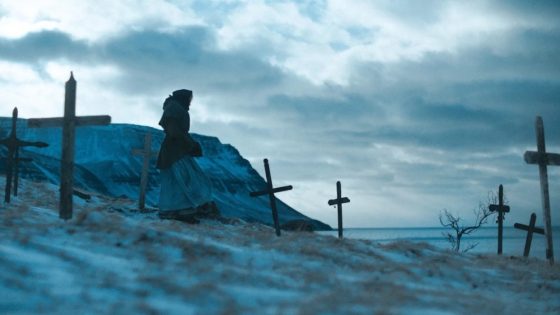A vicious 19th-century morality play that gives way to psychological horror, Thordur Palsson‘s “The Damned” draws on Icelandic folklore to create a tale of paranoia and superstition in an isolated outpost. A tiny fishing village plays host to the pressing question of whether to rescue a sinking ship nearby. The fishermen’s decisions in the wake of this terror from afar bring home their fears and regrets in a story told through dreams and shadows that, while often repetitive in its approach, is still effectively told.
Young widow Eva (Odessa Young) is left in charge of her husband’s fishing boat, which she lends to the town’s gruff fishermen while retaining decision-making ability. The village is surrounded by snow and icy waters, so every choice and every ration counts. The townspeople mostly get along, singing drinking and fishing songs by gas lamps in their cramped pub, but tensions seem to simmer just beneath this pristine surface in the form of masculine rivalries and notions of strength as survival.
When a boat of foreigners capsizes offshore, the town’s denizens are faced with the key dilemma of whether to spend time and resources on search and rescue. This debate grows more complex when the shipwreck begins washing valuable food and drink items ashore, inadvertently aiding the town’s survival. The question of whether to venture out to nearby, treacherous rocks, where survivors might be stranded, forms the ethical backbone of a story that slowly but surely transitions toward supernatural territory, rooted in legends that brush shoulders with the townspeople’s Christian beliefs. As their harsh decisions begin to haunt them, their guilt eventually takes chilling physical form, rooted in the question of whether the shadows they see in the darkness are real or specters of imagination.
Although candle-lit exposition launches the film in un-engaging territory, it soon blossoms into something sickly out in the open when the specter of death begins looming just off the village’s coast one morning. As soon as these major ethical quandaries take hold, seemingly static shots begin to feel unmoored. As the frame captures Eva, wrought with self-doubt over how best to lead, it begins to subtly bob, as though the camera were adrift at sea. The effect is nauseating, and the film only seems to find stable respite when Eva is around her young, handsome subordinate Daniel (Joe Cole), yielding yet another ethical dilemma when their chemistry becomes palpable.
The more the film unfolds, the more Young’s thoughtful performance, Eli Arenson’s layered, high-contrast cinematography and Stephen McKeon’s nerve-wracking score help craft a devious atmosphere. However, Palsson’s top-down approach to the story starts working against this accomplished artistry. Jump scare after jump scare all take the exact same form: Figures creep in the shadows, building tension that’s relieved by jarring, interruptive, noise, usually in the form of a bait-and-switch fake out. It’s enrapturing and mischievous the first time, but on its umpteenth repetition? Not so much.
The effect this has on the film is unfortunate. Its ensemble remains consistently dialed in to the plot’s building psychological pressures and widening social fissures, but its monotonous supernatural visions rob the movie of tension more often than not. The actors play each painfully remorseful note to perfection, but the movie’s representational, ghostly metaphors only end up complicating their emotional clarity. This is especially the case when Palsson begins unraveling the relationship between the story’s literal and dreamlike happenings. Much of the movie suffers from this over-explaining, though nowhere is it more apparent than in its climax.
That “The Damned” runs out of steam feels like an inevitable outcome. However, that it remains alluring for as long as it does — thanks in large part to Young’s magnetic performance, as a young woman burdened by responsibility — is a testament to its strengths as a psychological, atmospheric piece about deep remorse. That’s a specter that doesn’t need physical form to be terrifying, but it’s one given one too many regardless.
Source Agencies


